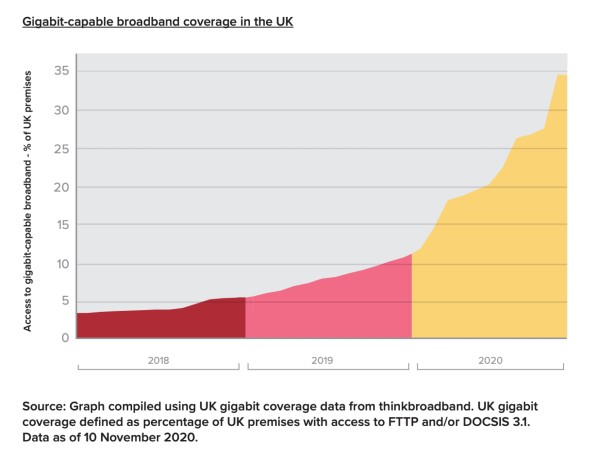Spending Review 2020 and communications infrastructure
While the dust may have settled from the 2020 Spending Review delivered on 25 November, questions remain. What is the meaning of the government’s change in position with regards to the 2025 target of gigabit-capable coverage for all, and revised spending profile for the Outside In programme?
Setting out the SR20 plans, the Chancellor of the Exchequer focused on jobs, infrastructure and innovation to support the economic recovery from COVID-19. For the tech sector there were a number of key announcements, including several public/private partnership initiatives driven by a new set of Government institutions and funds.
For the telecommunications industry, the long-awaited National Infrastructure Strategy (NIS)—published alongside SR20 — included a welcome investment to support the 5G Supply Chain Diversification Strategy, with £50m being delivered in 2021, as well as £200 million for UK-wide digital infrastructure programmes; including the Shared Rural Network for 4G coverage, Local Full Fibre Networks, and the 5G Testbeds and Trials Programme.
The telecoms sector was further encouraged by Prime Minister Boris Johnson’s introduction to the NIS with the view that “in a world likely to be working less from the office, our massive gigabit-capable broadband programme looks more important than ever.”
So far, so good?
The spending profile of DCMS’s multi-year capital programme — delivered by Building Digital UK and underpinned by the “Outside In” approach — revealed that just £1.2 billion of the government’s £5 billion commitment would be deployed between 2021-22 to 2024-25 to support the rollout of gigabit-capable broadband across the UK. The NIS itself was the clearest indicator of the government’s position: 85% of gigabit-capable coverage by 2025, and only 5% of that is government subsidised.
The disappointment felt by many in the UK’s telecoms sector was the loss of ambition for 100% gigabit by 2025, although the NIS stressed that government will seek to to accelerate roll-out further to get as close to that original target as possible, including an ambitious furtherprogramme of work to remove barriers to broadband deployment to maximise coverage in the hardest to reach areas of the country.
The devil is in the detail
Perhaps HM Treasury is rightly impressed with the pace of gigabit and full fibre rollout delivered by the private sector to date, and will provide the much needed strategic direction and practical help to enable this to continue. Despite the challenges of COVID-19 and lockdown restrictions, that pace of rollout has not abated in 2020.

Yet the £5 billion for “Outside In” was a vital aid to ensuring the pace of rollout can be matched in the final 20% of the UK for which commercially, deployment is not viableis commercially unviable. Mark Bridgeman, President of the Country Land and Business Association, has sought assurance from Minister for Digital Infrastructure Matt Warman following the announcement, “so that uncommercial areas can benefit from the outside-in approach and we can go some way in bridging the productivity gap that exists between rural and urban areas”.
techUK will continue to work with members and stakeholders to push government to bring as much of the funding forward (or should that be back) into the timeframe. Industry and government can collaborate effectively to tackle the connectivity challenges the UK faces, as the SRN programme attests. If the UK can rapidly recover from the pandemic, and deliver on promises for jobs, productivity and prosperity, the ambition for connectivity for all should not be adjusted.




